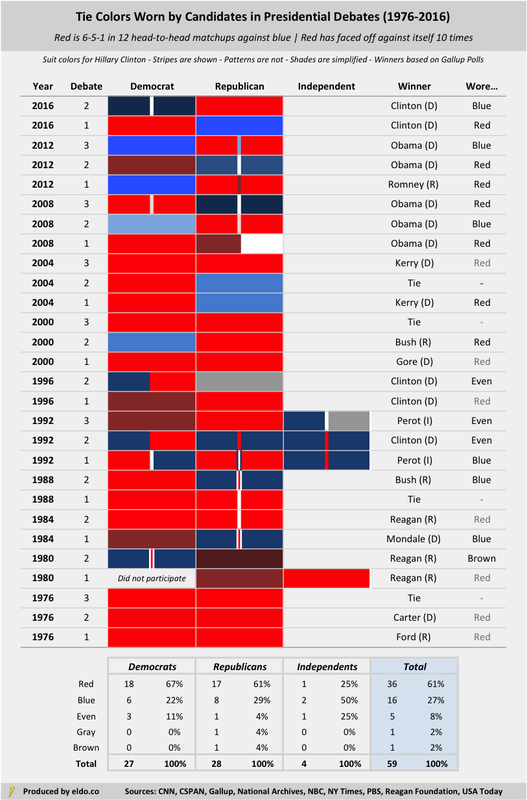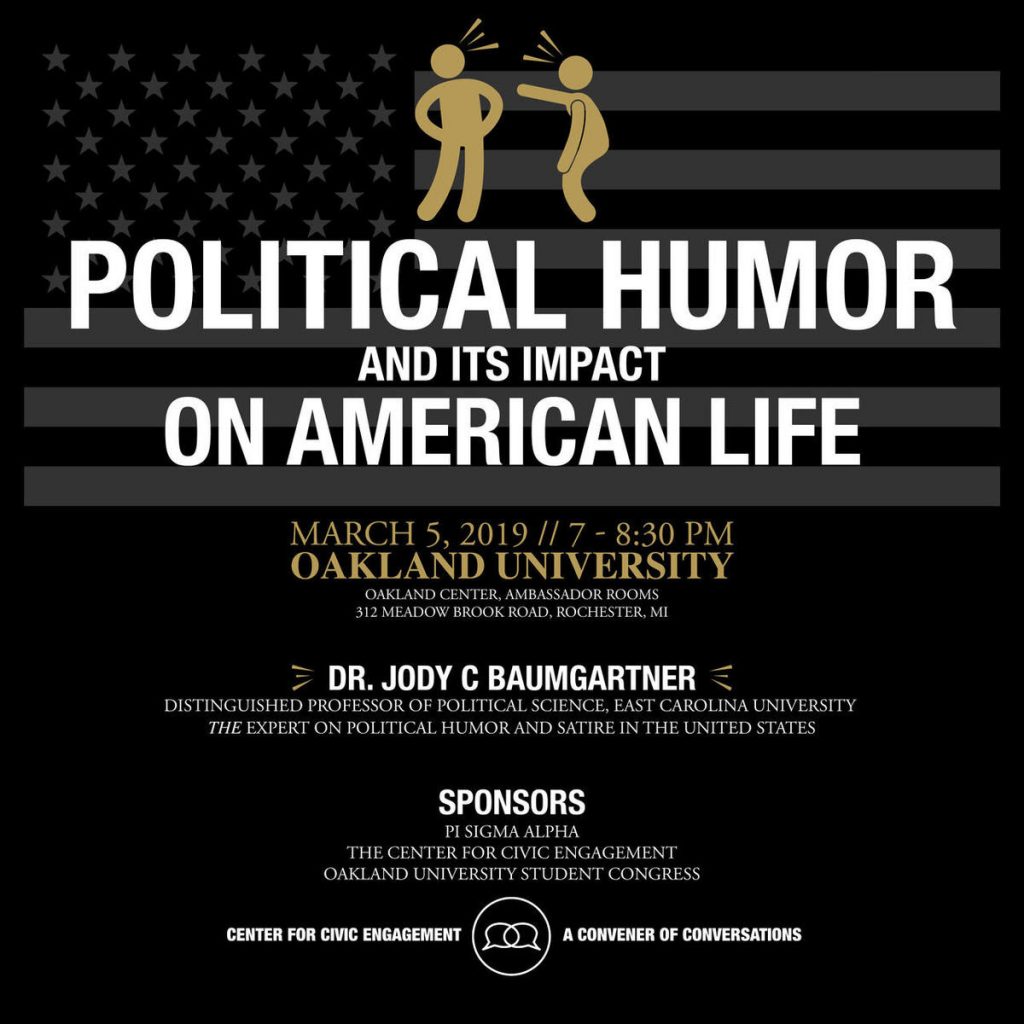And, just for fun: Tie colors worn by candidates during the presidential debates, going back to 1976:

And, just for fun: Tie colors worn by candidates during the presidential debates, going back to 1976:

Dr. Samantha Mosier has a new article published in the Review of Policy Research titled “How Values Shape Program Perceptions: The ‘Organic Ethos’ and Producers’ Perceptions of U.S. Organic Policy Impacts” (with David Carter and Ian Adams).
“Among the more recognizable programs related to natural and sustainable food is the United States Department of Agriculture’s National Organic Program. Although the robustness of the organic food market is difficult to contest, many debate the extent to which U.S. organic policy outcomes adequately serve consumers and the organic agriculture producers they rely on. This paper engages the debate from the perspective of certified organic producers. Drawing on the results of a nationwide survey of USDA‐certified producers, we first provide a snapshot of how producers assess the environmental, consumer, and market impacts of U.S. organic food policy. We then examine the extent to which organic producers’ policy impact perceptions are associated with their alignment with an “organic ethos”—understood as producers’ commitment to core organic principles and the organic movement. The paper highlights producers’ values as perceptual filters and cognitive mechanisms that help shape producers’ policy impacts perceptions, illustrating a contributing factor to the enduring nature of organic policy debates.”
See https://onlinelibrary.wiley.com/doi/abs/10.1111/ropr.12330?af=R.
Dr. Jonathan Morris and Dr. Peter Francia recently completed two new survey reports for the Center for Survey Research.
One focused on public opinion in North Carolina concerning confederate monuments on college and university campuses, and the second on public opinion in New Jersey and Mississippi, concerning legalized sports gambling and Super Bowl betting activity.
The results of both surveys received media coverage through the Associated Press.
Dr. Michal Koran will deliver a public lecture on March 25, 2019, from 4-6:00 pm, in Room 2409 of the Joyner Library. The topic will be Transatlantic Relations in the Trump Era: “Central Europe, the EU, and the USA: Lost in Transition?”
All are welcome!
Michal Koran is the President of the Board of the Global Arena Research Institute and the former Deputy Director of the Aspen Institute Central Europe. His research focuses on foreign policy analysis of the Central European countries, Central European sub-regional cooperation and Central Europe in European and World Affairs and in Trans-Atlantic Relations.

Hunter Whittington, a sophomore at East Carolina University, is one of 262 students selected as a 2019-2020 Newman Civic Fellow by Campus Compact, a Boston-based nonprofit organization working to advance the public purposes of higher education.
Whittington is an ECU Honors College student from Clayton majoring in political science and economics. He has been involved with the Student Government Association, the Pre-Law Society and the Center for Leadership and Civic Engagement.
He became interested in politics while still in high school, when he started working on voter outreach during the 2016 election. Since then, he has conducted research on millennial voter turnout, organized voter registration drives, worked to keep polling places open on campus and advocated for student voter rights, according to his personal statement on the Newman Civic Fellows website.
Whittington “is a student leader, exhaustive in his efforts to raise awareness for and increase the level of civic engagement on our campus,” said ECU Chancellor Cecil Staton. “Currently, he is working to create a coalition of college students and local residents to foster a spirit of civic engagement in our community and raise awareness for local issues by giving constituents the tools to fight for the issues they care about.”
The Newman Civic Fellowship, named for Campus Compact co-founder Frank Newman, is a one-year experience emphasizing personal, professional and civic growth for students who have demonstrated a capacity for leadership and an investment in solving public problems.
Through the fellowship, Campus Compact provides a variety of learning and networking opportunities, including a national conference of Newman Civic Fellows in partnership with the Edward M. Kennedy Institute for the U.S. Senate. The fellowship also provides participants with access to apply for exclusive scholarship and post-graduate opportunities.
“We are proud to recognize each of these extraordinary student leaders and thrilled to have the opportunity to engage with them,” said Campus Compact President Andrew Seligsohn. “The stories of this year’s Newman Civic Fellows make clear that they are committed to finding solutions to pressing problems in their communities and beyond. That is what Campus Compact is about, and it’s what our country and our world desperately need.”
The Newman Civic Fellowship is supported by the KPMG Foundation and Newman’s Own Foundation.
Dr. Armin Krishnan recently published the article, “Controlling Partners and Proxies in Pro-Insurgency Paramilitary Operations: The Case of Syria” in the journal of Intelligence and National Security.
“Pro-insurgency paramilitary operations (PMOs) are a rare type of covert action that aim to destabilize or overthrow a hostile government or defeat nonstate groups with no cooperation from a host government. The article analyzes US covert operations in Syria since 2011 by applying Principal–Agent Theory (PAT) to explain the inherent difficulties involved in controlling partner states and proxies. The nature of pro-insurgency PMOs is such that main tasks have to be delegated to partners and proxies, which reduces the ability of the US government to achieve desirable outcomes, especially whenever the goals of the partners and proxies are not well-aligned with US objectives as is the case in Syria.”
(See https://www.tandfonline.com/doi/full/10.1080/02684527.2018.1560605).
On March 5, Dr. Jody Baumgartner delivered a lecture on the place of political humor in America life, hosted by Oakland University’s Center for Civic Engagement.
